Career of the Month
Online science educator Julia Brodsky
Online educators present courses on a broad range of topics, to children or adults. Course lengths and formats vary too—they can be live or asynchronous, interactive or lecture based, or any combination thereof. Julia Brodsky is an independent educator in Rockville, Maryland who offers a multi-year astrobiology curriculum to upper-elementary and middle-school students via her online school, Art of Inquiry, and also hosts webinars featuring other science experts.
Work Overview
Most of my work involves the development and refinement of curriculum and educating myself about cutting-edge science, by reading, watching videos, and taking courses on Coursera. Then I discuss my questions with specialists. Aside from that, I design hands-on homework experiments, and review and provide feedback on students’ work. I also write articles and blogs about science education, consult with teachers and families, and volunteer as a reviewer for NSTA.
I work more than eight hours a day, but I really enjoy what I am doing, so it does not feel like drudgery. I can schedule my work to accommodate my professional and family needs. I teach in the mornings and in the evenings, to accommodate students from other time zones. Many students prefer classes on weekends, so Monday is my day for relaxation and catching up on home responsibilities.
My favorite part is sharing the awe of my students when they learn something new about the world or about themselves, and seeing students asking profound questions, or finding unusual solutions to problems. I also love learning from my students and other educators and scientists, and helping new teachers. Some other things that a business owner needs to do are less exciting for me, such as filling out state or federal paperwork, analyzing revenue, or dealing with website trolls.
Career Path
Growing up in Russia, my parents and grandparents encouraged science discussions, and I really enjoyed reading science fiction. In middle school, I filled in for a sick teacher for a week, teaching students who were about five years younger than me. I taught the kids to self-organize to teach themselves, and they told me they wanted me to be their teacher until the end of the year. This encouraged me to read and think about education.
I attended a wonderful magnet math and science high school in St. Petersburg, and then majored in space research in college. I came to the United States soon after getting my master’s degree and joined United Space Alliance to work on its contract with NASA to train a mixed U.S.-Russian International Space Station (ISS) crew. While there, I also received NASA’s training on subjects such as curriculum development, aerospace engineering, and international negotiations. I began a PhD program in aerospace engineering at Rice University, but had to stop when my first child was born with a disability.
Later, I worked as a contractor at NASA’s Ames Research Center, helping to develop a personalized robotic assistant for ISS crews, and then as a math and science teacher at several private and public schools around the country. Looking for informal math education for my own children, I was unable to find a program that aligned with my expectations, which prompted me to start a math circle for them and their friends. For many years, I worked as a risk manager on various NASA contracts, while running a rapidly growing math circle and volunteering as a Math Kangaroo competition organizer.
I enjoyed developing and teaching my own space-science curriculum at a private school, but I wanted to share my work with a wider audience. So two years ago, I started my online space exploration and astrobiology school for students all over the world.
Career Highlights
As a young astronaut instructor, I taught an experienced shuttle astronaut how to control the International Space Station. He was not sure I could teach him much, so I spent several days developing a teaching scenario that would surprise him at every turn, uncovering things that were counterintuitive to him. At the end, he told me that it had highlighted the importance of having a growth mindset.
I once taught a very serious little boy who, prior to the first class, gloomily informed me that he hated math and science, and would hate them forever. He barely knew how to write, but after a few classes, he wrote a postcard to me. It said, “You do a good job!” Later we became good friends, and he got very involved with math and science projects.
Knowledge, Skills and Training Needed
Running one’s own education business is lots of fun, but requires a wide range of skills. First, you need to understand what and why you want to teach—to teach specific skills, introduce students to a new field or industry, change students’ understanding of the world, or teach students to ask better questions. The skills and training you need are easy to see if you state your goals clearly.
I have used lots of my space-physics knowledge, and all the teaching experience I’ve gained over the years by teaching kids and adults. I have also learned marketing skills; expanded my network of scientists and educators; presented at scientific and educational conferences; written blogs, articles, and books; hosted webinars; practiced website design; gained some financial and legal knowledge; and hired and managed contractors.
Advice for Students
Take time to explore what you like and dislike. Pursue your own interests—learn from others, but do not follow them. Don’t be intimidated if you do not know something, and do not be afraid to ask questions.
Bonus points
Brodsky’s Education: B.S. and M.S. in space research from St. Petersburg Polytechnic University, Russia.
Website: https://www.artofinquiry.net
Related Careers: science writer, astrobiologist, science-fiction writer, science teacher.



